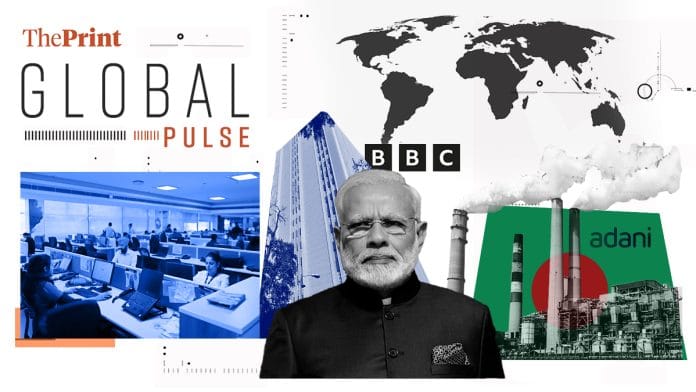New Delhi: The publisher of the New York Times, A.G. Sulzberger, wrote an interesting opinion piece on declining press freedom for the Washington Post over the weekend. India served as his cautionary tale.
The piece, written as the American presidential race gets closer and could see Donald Trump returning to the White House, details the myriad ways in which the press has been undermined across the globe. He lists Hungary, Brazil and India as the democracies where press freedom has taken a direct hit.
It’s not by muzzling journalists. The Indian playbook involves deploying tools of the State, like notoriously complex tax laws against the BBC or an opaque immigration system used to strip foreign reporters of their credentials. Sulzberger points out how BBC’s New Delhi and Mumbai offices were raided in 2023. The Narendra Modi government, he writes, “has a history of carrying out these “tax surveys”, as the authorities called them, against independent Indian news organisations whose reporting has “incurred his regime’s wrath”.
“The raid of one of the world’s best known and regarded news organisations woke the rest of the international community to what was already an ever-present reality for Indian journalists,” he writes.
The case of Vanessa Dougnac, a French journalist whose work permit was revoked after 20 years of living and working in India, is Sulzberger’s second example.
He writes that much of the mainstream press is referred to as “godi media”—that’s how successful the government has been at subverting any reporting that’s critical of it. “Democracy itself, though still intact—as gains by opposition parties in the recent Indian election underscored—is viewed as more tenuous and conditional,” he writes.
The editorial ends with a salute to journalists in countries like Hungary, India and Brazil. But if most Indian users of X are to be believed, both the Times and the Post are decidedly anti-Indian and determined to misrepresent India. Sulzberger writing for the Post is a double whammy that could serve as conspiratorial confirmation.
Bloomberg rings a different warning bell: India will need to create 115 million new jobs in 2030, according to a report by investment banking firm Natixis, which it describes as a “Herculean” job.
“Prime Minister Narendra Modi has swept aside many obstacles to his nation’s growth, proving especially effective at boosting infrastructure and luring foreign investment. But delivering on the human potential will be a monumental challenge,” the opinion piece worries.
India has to overcome challenges like womens’ non-participation in the workforce and too much labour employed in the informal sector. Modi has his work cut out for him, Bloomberg writes.
It cites government data to show that since the start of Modi’s term to the end of March 2022, 220 million people had applied for central government jobs, but only 7,22,000 were recruited. The demographic dividend could become a democratic curse, it quotes an Economics professor as saying.
“India needs nothing short of a miracle if it’s to pull off a repeat of China’s economic advance,” the piece declares. “And the clock is ticking. There’s a 15-year window where the labour force expands, steadies and then begins to age.”
Another piece in Bloomberg, this one by columnist and senior fellow at the Observer Research Foundation, Mihir Sharma, says that India is making a mistake by scorning advice from international multilateral agencies, like the World Bank. India hasn’t been participating much in the global value chain, Sharma writes, whereas other developing countries that do have seen both jobs and prosperity expand.
The World Bank’s suggestion that India should join the Regional Comprehensive Economic Partnership—the giant trade agreement that includes the Association of Southeast Asian Nations and partners in East Asia and Oceania—could “raise hackles in New Delhi”, he writes. India pulled out of RCEP negotiations last year as policymakers reportedly thought that signing up for a trade deal that centred China was a mistake.
India has to participate in trade to keep growing, Sharma writes, and therefore staying in the RCEP would have been better than pulling out. “If you intend to offer an alternative to China in global value chains, you first need to participate in them,” Sharma writes.
Meanwhile, the Financial Times reports that the Adani Group has warned Bangladesh’s new government that its backlog of payments is “unsustainable”. Bangladesh is reportedly $500 million behind in dues on a power project to supply coal from Adani’s 1600 megawatt plant in Godda, Jharkhand.
Adani Power told FT that they are in “constant dialogue” with the Bangladesh government, but that it would “continue to supply reliable and competitively priced power from our Godda facility to Bangladesh, despite mounting dues”.
Bangladesh reportedly owes Adani around $800 million in total, across power projects. Adani said that it does not have plans to divert supplies away from Bangladesh, even as India altered guidelines after former prime minister Sheikh Hasina’s ousting to allow electricity exporters to sell domestically.
Also Read: Global media on why ‘fascism is in the air’ in India & ‘hate’ may derail its ties with Dhaka







I love only Bloomberg reporting about india because they split facts rather than propoganda.
BBC, CNN, NYT, washington post, all busy in anti India campaign and asking about freedom of press? Bring one article from these western media when they critics Ukraine and admit Ukraine is loosing war? All are propaganda mouthpiece. But seriously india need to think about Bloomberg analysis